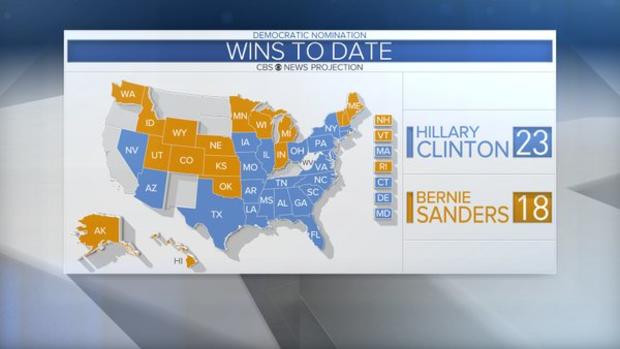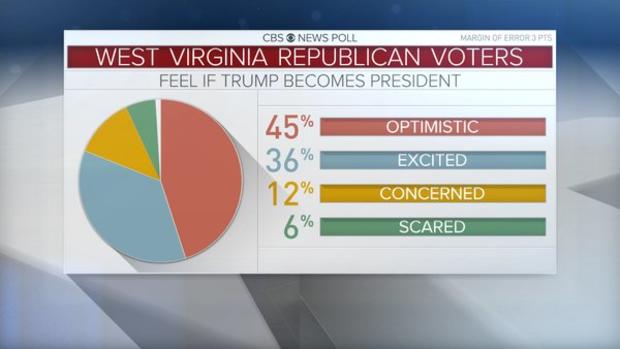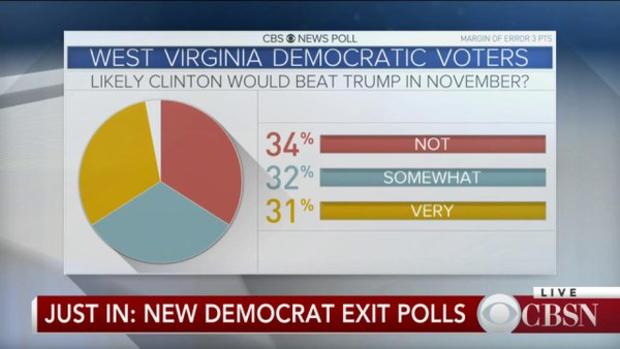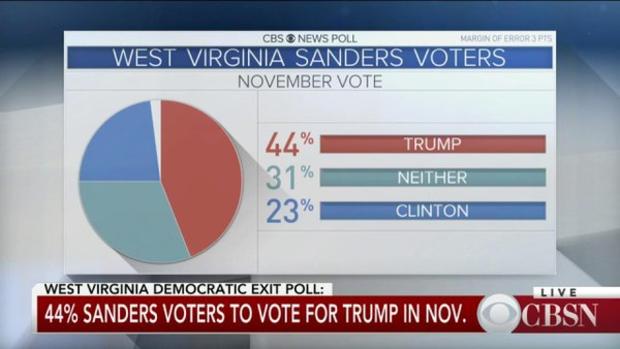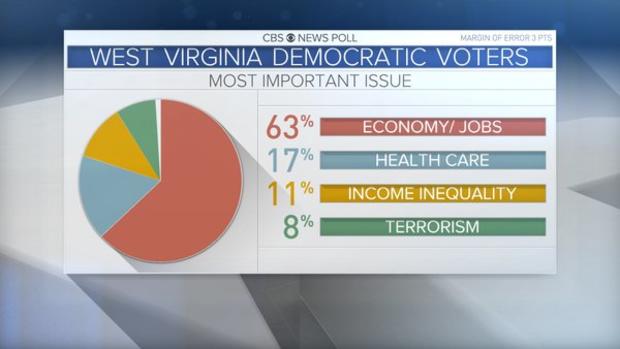Live updates: Trump wins West Virginia, Nebraska; Sanders wins W.V. Democrats
10:13 p.m. Trump released a statement on his pair of victories in tonight's West Virginia and Nebraska primaries:
"It is a great honor to have won both West Virginia and Nebraska, especially by such massive margins. My time spent in both states was a wonderful and enlightening experience for me. I learned a lot, and that knowledge will be put to good use towards the creation of businesses, jobs, and the strengthening and revival of their economies. I look forward to returning to West Virginia and Nebraska soon, and hope to win both states in the general election. Likewise, my time spent last week with the great people of Oregon will hopefully lead to another victory next Tuesday."
9:41 p.m. Shortly after the West Virginia race was called for Sanders, he issued a statement noting this is his 19th win and acknowledging the "uphill" path ahead.
"We fully acknowledge we have an uphill climb ahead of us, but we're used to that. We have been fighting uphill from the day this campaign began. And after all the votes are cast and counted and this contest moves to the Democratic National Convention in Philadelphia, the delegates will decide which candidate is the strongest nominee to take on Donald Trump in November. All of the evidence indicates that I am that candidate."
9:26 p.m. CBS News projects Sanders wins the West Virginia Democratic primary.
- CBS News Election Center
- GOP West Virginia results
- Democratic West Virginia results
- GOP Nebraska results
9:05 p.m. Polls are now closed in Nebraska's Republican primary, and CBS News projects Trump wins that primary as well.
8:10 p.m. As we wait for a call in the West Virginia Democratic primary, here's a summary of Clinton's and Sanders' wins so far this primary season:
7:53 p.m. Exit polling out of West Virginia finds GOP voters there have an overwhelmingly positive view of a Trump presidency, which is perhaps why he won so easily there:
7:42 p.m. For the Democrats, Sanders is leading in West Virginia as expected. He is currently getting the majority of support of both men and women in the exit poll results among West Virginia Democratic primary voters. About a third of Democratic primary voters are independents, compared with 18 percent in 2008. Sanders is running strong with independents, getting about 7 out of 10 voters.
Three in 10 West Virginia Democratic primary voters say someone in their household works in the coal industry, and of them almost two-thirds are backing Sanders.
Experience remains a strength for Clinton. She is getting the support of three-quarters of voters who want a candidate with right kind of experience, compared with just 24 percent for Sanders.
7:30 p.m. The polls are now closed in West Virginia. CBS News projects that Donald Trump wins the Republican primary, and that Bernie Sanders is leading the Democratic primary.
6:00 p.m. According to exit polls, Republican voters in West Virginia today said that the most important issue facing the country is the economy and jobs. Government spending and the economy top the list in Nebraska for Republican primary voters.
Primary voters in West Virginia are looking for a candidate who can bring needed change. In Nebraska, bringing needed change and telling it like it is are the most important candidate qualities.
More than four in ten Republican primary voters in both West Virginia and Nebraska are angry at the federal government. The majority of primary voters in West Virginia and Nebraska feel betrayed by politicians from their political party.
Few Republican voters see their party as united now. In WV, another 62 percent expect it will become united in November, but 26 percent think it will not be. Expectations are more negative among Nebraska voters: 45 percent say their party will still be divided in November.
If Trump and Clinton were the general election candidates, most Republican primary voters in both states say it is at least somewhat likely that Trump would beat Clinton in November. In Nebraska, fewer think that is very likely to happen. Most Republican voters say they would vote for Trump against Clinton.
If Trump is elected president, most Republican primary voters in West Virginia feel positive about what he would do in office, while just 18 percent are concerned or scared. In Nebraska, 37 percent would be concerned or scared, but six in ten would be optimistic or excited.
5:32 p.m. About a third of West Virginia Democratic primary voters were looking for a candidate who cares about people like them, this was closely followed by voters seeking a candidate who is honest/trustworthy (28%).
Almost half of Democratic primary voters in West Virginia (47 percent) identify as liberal, among the lowest we've seen in exit polling this year. More than four in 10 Democratic primary voters in West Virginia want to see the next president actually change to policies that are less liberal than President Obama's--the highest in the primaries so far.
When looking at the primary voters' views on the selection process, most Democratic primary voters (59 percent) say the process for selecting a Democratic nominee has been fair. But those who support Sanders are much less likely than Clinton supporters to think the process has been fair.
Looking ahead to the general election, most Democratic primary voters in West Virginia--six in 10--say it's likely that Clinton would beat Trump in November if she were the nominee. A third say that's not likely--a figure that rises to 47 percent among Sanders voters.
More than four in 10 Democratic primary voters would back either Clinton or Sanders if they were the nominee, but a third say they would vote for Trump, and another one in five say they wouldn't vote for either.
Support for Trump in the general election is largely driven by independents who voted in the Democratic primary. More than half of them would back Trump against either Clinton or Sanders.
5:15 p.m. The economy is the top issue for Democratic primary voters in West Virginia so far, with 64 percent selecting it over income inequality, health care or terrorism.
5 p.m. After the high drama of last Tuesday night's Republican primary, in which Texas Sen. Ted Cruz exited the race and cleared the way for Donald Trump as the GOP nominee, this week's primaries should be comparatively quiet.
In West Virginia, both Democrats and Republicans vote, while in Nebraska it's just Republicans (Nebraska Democrats held their caucuses on March 5). Polls close in West Virginia at 7:30 p.m. and in Nebraska at 9 p.m. ET.
Sanders is expected to do well in the Democratic primary, though it's likely to do little to change the incredibly difficult delegate math facing him in the final weeks of the primaries: Clinton only needs to win 17 percent of the remaining delegates to clinch the nomination.
Trump is now the only remaining candidate on the Republican side, so he's expected to win both states tonight--but there's a chance Cruz, who has only been out of the race for a week, will pick up some more delegates.
On the Republican side, 34 delegates are up for grabs in West Virginia and 36 will be allocated in Nebraska. For Democrats, 37 delegates are at stake in West Virginia.
Tonight will likely continue to help both parties' front-runners--Trump and former secretary of state Hillary Clinton--cement their delegate leads heading into the final few weeks of voting. According to CBS News' latest count, Trump has 1,065 of the 1,237 delegates necessary to clinch the GOP nomination; for Democrats, Clinton has 2,228 of the required 2,383. Sanders has 1,442 delegates.
Follow here for live updates.
CBS News Poll Analyst Melissa Herrmann contributed to this story.
